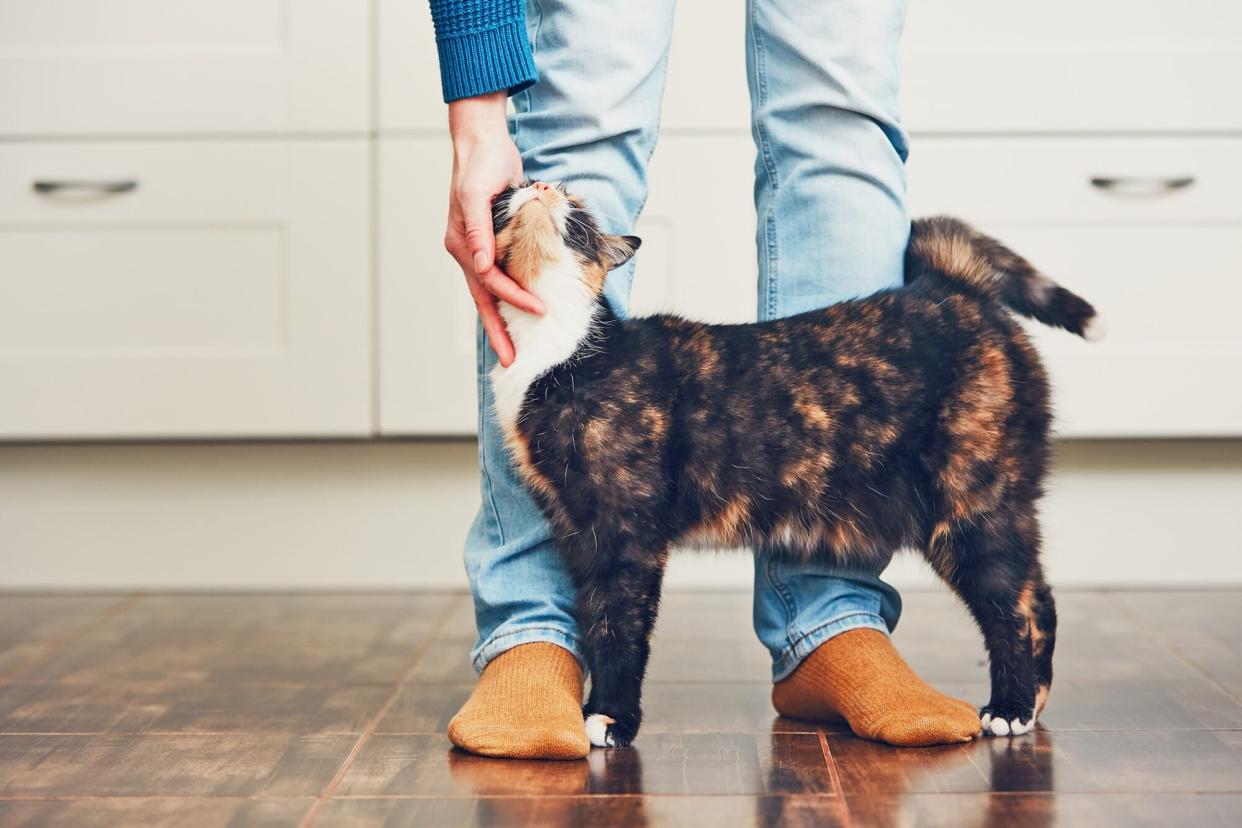If You See Blood in Your Cat's Stool, Here's What to Do to Help Your Pet

Chalabala / Getty
It's totally natural to feel a little freaked out when you first see blood in your cat's stool, especially if they're acting normal. But this situation is a huge clue to your favorite feline's health, so here are some methods to determine what might be happening and more importantly, when to schedule a prompt checkup with your vet.
What Does Blood Look Like in a Cat's Stool?
Bonnie Bragdon, DVM, MS, is co-founder of the Independent Veterinary Practitioners Association. She says pet parents see two primary types of blood in cat stool:
Digested blood, which usually makes the entire elimination black
Fresh or bright red blood, which might present in cat poop, diarrhea, or on your cat's anus
These photos show the difference.
The National Kitten Coalition points out that kittens often have other issues, especially in their first few months of life, that might present many different poo colors. This chart explains probable causes and need for veterinary care.
Now, if you're cleaning the litter box and notice scattered droplets of fresh blood, this usually indicates blood in your cat's urine. The American Veterinary Medical Association states it could be a symptom of any number of feline urinary health concerns, including urolithiasis, urinary infection, urinary tract obstruction, and feline idiopathic cystitis. Bragdon says these conditions require immediate veterinary care.
Reasons Your Cat Has Blood in Their Stool
It depends on what the underlying problem might be. Bragdon says a small amount of blood observed once is unlikely to be a sign of life-threatening disease. Whew! Nevertheless, pay attention.
"The main reasons for blood in cat stool are trauma associated with cat constipation or blood from colitis [inflammation of the large intestine or colon]. Other reasons include a foreign body, cancer, inflammatory bowel disease, an infection—there can be a lot," Bragdon says. Even intestinal parasites such as worms, which don't always present symptoms such as blood in cat stool, actually might in particular cases.
This is why watching for blood in your cat's poop and keeping a record of it and any other symptoms your kitty displays will help your vet get to the bottom of the condition. For example, Bragdon says black, tarry stool is often a sign of an upper gastrointestinal disease, and the volume of blood is important to note. "If feces are black, it could indicate bleeding in the stomach and small intestine," she says.
Here are some of Bragdon's additional explanations for blood in cat stool:
Fresh, red blood indicates a problem in the large intestine or rectum
Hard feces with bright red or fresh blood could point to constipation, which might be the primary problem, or a secondary symptom to stricture or obstruction of the gastrointestinal tract
Soft or watery stools with fresh blood may be a sign of large bowel inflammation
Additionally, it's easy to get concerned if you see both blood and mucus in cat stool. A little mucus in poo is normal, as it's an intestinal lubricant. However, any more than usual combined with blood means kitty needs to see the vet soon.
What to Do if There's Blood In Your Cat's Poop
First, take pictures and track your cat's behavior. Even if your feline pal seems fine, Bragdon says you still want to document her symptoms over a couple of days and watch for any signs of deterioration so your vet has a clearer picture of her overall health.
Here are other symptoms that require immediate attention, usually within 24–72 hours:
Lethargy
Straining to eliminate
Stool with unusual odor
Not eating or drinking
Copious amount of blood, such as needing more than one wipe to clean
Diarrhea that doesn't go away, or seems to clear up after three days but then returns
Hard stool for more than two days
No stool elimination at all for two days
Why Is My Cat Acting Normal if There's Blood in Their Stool?
Home remedies for blood in cat stool are rarely the answer, but it's possible that the blood is a sign that her digestive system is a tad upset, so a temporary tweak to her diet might make her feel better.
"If stool is firm and difficult to squish between a paper towel, feed your cat wet food and water," Bragdon says. "If stool is watery or soft, feed plenty of water and consider a bland diet."
However, cats behaving normally who have a small amount of blood or occasional blood should still have a vet exam within a week or two to rule out more serious conditions.
RELATED: Cat Dehydration: Symptoms and Treatments to Get Your Kitty More Fluids

